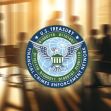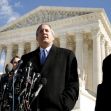California has a requirement that tax-exempt charities disclose the identity of their top financial donors to the state. On Friday, January 8, 2021, the U.S. Supreme Court agreed to hear a challenge to that requirement. (The Attorney General of California, Xavier Becerra, has been nominated to run the Department of Health and Human Services in the Biden administration.)
A lower court ruling that said California’s attorney general could require two nonprofit organizations to furnish him with donor details. The groups in question, Americans for Prosperity Foundation (the Foundation) and the Thomas More Law Center (TMLC), argued that this demand infringed upon their freedom of speech and association under the First Amendment of the Constitution.
In Americans for Prosperity Foundation v. Becerra, the petitioner says, “No California law or regulation expressly requires charities to file their Schedule Bs with the California Attorney General in renewing their annual registrations.”
California argued that the information is required from these nonprofits as part of the attorney general’s duty to prevent charity fraud. This policy affects not only California residents, but also anyone across the nation who donates to ANY nonprofit that asks for donations in California, as well.
The state of California requires that charities provide a copy of their IRS tax form that shows major donors who contribute large amounts. Larger groups must disclose donors giving $200,000 or more in any one year. This disclosure practice has been required since 2010. AG Becerra says Schedule Bs weren’t demanded before then because of “staffing shortages.”
At the district court level, a judge ruled in favor of the nonprofits. The 9th U.S. Circuit Court of Appeals in San Francisco reversed that decision in 2018, which provoked the appeal to the Supreme Court.
TMLC is a nonprofit based in Michigan. They defend and promote religious freedom, the sanctity of human life, and moral and family values. Their supporters and employees have been on the receiving end of intimidation, death threats, boycotts, and an assassination attempt from those with opposing viewpoints. TMLC wants to make sure their donors’ information stays private, protected, and secure.
To make the situation even more ominous for TMLC and others, the California Attorney General’s Office has a history of confidential information being leaked from inside. In 2009, employees mislabeled nearly 1800 confidential Schedule B tax documents as public. This was not an isolated incident.
The Foundation said they found a “complete Schedule B for Planned Parenthood Affiliates of California,” including “the names and addresses of hundreds of donors,” that had been made public. The possibility that the California Attorney General’s Office will accidentally disclose donor information is great, and no punishments exist for willful or malicious leaks.
The Foundation says, “California lacks any satisfying explanation for why it is not content to send targeted, individualized requests for such information to the handful of charities it actually investigates.” In 1958 the Supreme Court recognized that the state of Alabama could not demand the NAACP’s membership lists. Is requiring disclosure of Schedules B a similar invasion of privacy?
TMLC has fundraised in California for years and has never disclosed its donors before.
The Foundation is linked to industrialist Charles Koch and his brother David. A large number of supporters of the court case believe that the law requiring the Schedule B disclosure impinges on the right of free association with groups or organizations.
Trump’s administration has urged the Supreme Court to hear the case, but at the same time defends the federal government’s right to request the same information.
The Institute for Free Speech, another California group that challenged the requirement, has an appeal pending at the high court as well.






